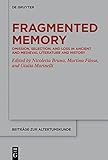Fragmented Memory : Omission, Selection, and Loss in Ancient and Medieval Literature and History / ed. by Nicoletta Bruno, Martina Filosa, Giulia Marinelli.
Material type: TextSeries: Beiträge zur Altertumskunde ; 404Publisher: Berlin ; Boston : De Gruyter, [2022]Copyright date: ©2022Description: 1 online resource (XIII, 325 p.)Content type:
TextSeries: Beiträge zur Altertumskunde ; 404Publisher: Berlin ; Boston : De Gruyter, [2022]Copyright date: ©2022Description: 1 online resource (XIII, 325 p.)Content type: - 9783110740387
- 9783110742091
- 9783110742046
- Classical literature -- Criticism, Textual
- Literature, Ancient -- Criticism, Textual
- Literature, Medieval -- Criticism, Textual
- Transmission of texts -- History
- Historisches Gedächtnis
- Literarisches Gedächtnis
- Verlorene Texte
- Überlieferungsgeschichte
- LITERARY CRITICISM / Ancient & Classical
- Textual transmission
- historical and literary memory
- lost texts
- 880.09 23/eng/20220325
- PA3013 .F73 2022
- online - DeGruyter
- Issued also in print.
| Item type | Current library | Call number | URL | Status | Notes | Barcode | |
|---|---|---|---|---|---|---|---|
 eBook
eBook
|
Biblioteca "Angelicum" Pont. Univ. S.Tommaso d'Aquino Nuvola online | online - DeGruyter (Browse shelf(Opens below)) | Online access | Not for loan (Accesso limitato) | Accesso per gli utenti autorizzati / Access for authorized users | (dgr)9783110742046 |
Frontmatter -- Preface -- Acknowledgements -- Contents -- List of Abbreviations -- Mechanisms of Memory and Forgetting -- Part 1: Mechanisms and Criteria of Textual Loss and Selection -- The Stobean Text Tradition of Pseudo- Aristotle De mundo -- Pessimi poetae: On Philodemus, Ancient Tradition, and Selection Criteria -- Callimachus’ Epigrams Before the Greek Anthology: Indirect Tradition from the Imperial Age (1st–3rd century) -- Dionysius of Halicarnassus’ Thuc. 5.13–15: The Classical Canon and the Fragments of Early Greek Historia -- Part 2: Lost Texts (Re-)Discovered -- Reading and Reconstruction Problems in a Herculaneum Roll with Complex Stratigraphy: The Case of P.Herc. 89/1301/1383 -- P.Giss.Univ. 2.17 Reconsidered -- The Inscription of the Church of Santa Maria Assunta in Castellaneta (Taranto): The History of a Rediscovered Titulus -- Hesiodic Quotations in the Scholia to Homer: Textual Variants and Traces of Ancient Exegesis -- Part 3: Voluntary Omissions and Desire for Oblivion -- Better Not to Speak under Trajan? Reticence and Omission in Tacitus -- Damnatio Memoriae of the High-Ranking Senatorial Office-Holders in the Later Roman Empire, 337–415 -- Oblivio non natura nobis venit: Cassiodorus and the Lost Gothic History -- Part 4: Re-Working the Known -- Archaic Heroism in Euripides’ Scyrians -- An Example of Erotic Heroism: The Controversial Case of the Epithalamium of Achilles and Deidamia -- Literary Allusion towards Politics (Claud. Cons. Stil. 1.1–9) -- Traces of Sophocles’ Tereus in Ovid’s Metamorphoses 6.424–674 -- List of Contributors and Editors -- Index
restricted access online access with authorization star
http://purl.org/coar/access_right/c_16ec
Chance, in addition to the unavoidable ambiguity caused by time, is one of the main guilty parties in the transmission of ancient texts – or lack thereof. However, the same cannot be said for what concerns the mechanisms of selection and loss of historical and literary memory, where the voluntary awareness of obscuring is often part of a precise aim, thus leading the cultural memory of a literate society to become fragmented. The present volume explores the devices and criteria of selection and loss in Ancient and Medieval texts and the subsequent fragmentation of such literature, but it also addresses the questions of the damnatio memoriae, of literary strategies such as reticence and omission, as well as of known texts deemed lost but re-found thanks to state-of-the-art methods in digitization. The many and diverse nuances of the concepts of omission, selection, and loss throughout Ancient and Medieval literature and history are illustrated through a number of case studies in the four sections of this volume, each examining a different facet of the topic: ‘Mechanisms and criteria of textual loss and selection’, ‘Lost texts re-discovered’, ‘Voluntary omissions and desire for oblivion’, and ‘Re-working the known’.
Issued also in print.
Mode of access: Internet via World Wide Web.
In English.
Description based on online resource; title from PDF title page (publisher's Web site, viewed 29. Mai 2023)


